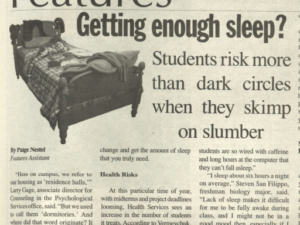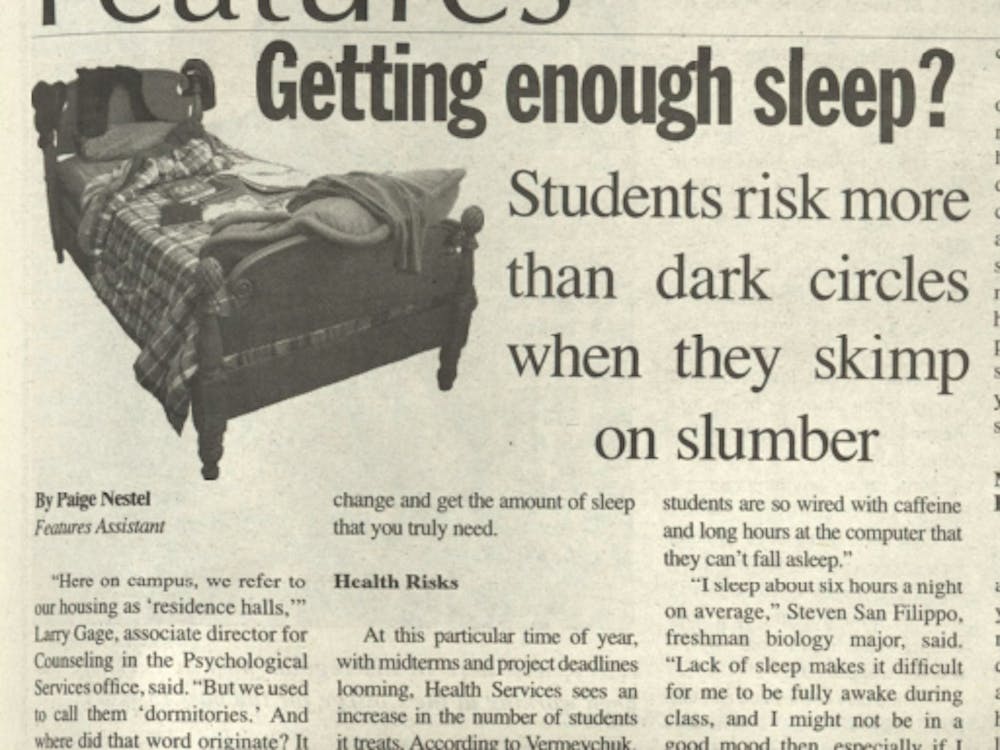By Jane Bowden
Features Editor
With finals just around the corner, students will soon be pulling all-nighters and cramming for exams at the last minute.
In an October 2005 issue of The Signal, the features assistant reported on the dangerous mental and physical effects of sleep deprivation in young adults, such as impaired concentration and a weakened immune system.

"Here on campus, we refer to our housing as 'residence halls,"' Larry Gage, associate director for Counseling in the Psychological Services office, said. "But we used to call them 'dormitories.' And where did that word originate? It comes from 'dormir,' the Spanish verb for sleeping."
But in this day and age, with so many distractions facing today's college students including instant messaging, online gaming, projects, exams and partying (to name a few), is there really a lot of sleeping going on? Are we getting the amount of shut-eye we need to be healthy, productive citizens in society? The answer, it seems, is a resounding no.
According to the National Sleep Foundation, the most natural sleep cycle for teenagers and young adults is 15 hours of daytime and evening activity followed by nine to nine and a half hours of sleep each night. Adults need between seven and nine hours of sleep each night to feel their best.
"It's probably best to get nine to 10 quality hours of sleep at one time," Janice Vermeychuk, a family nurse practitioner and associate director of Health Services, said.
Yet with fluctuating class schedules, midterms and finals, maintaining a strict sleep schedule can be a difficult, if not impossible, task.
“This semester, I'm lucky if I get seven (hours of sleep) a night," Adam Brusotti, junior secondary education/history major, said. "I feel tired and run-down all the time. At about 12:30 p.m. or 1 p.m., I hit a wall. I start to doze off wherever I am. Driving, in class, sitting down, reading — it doesn't matter."
Brusotti's problem is one that most college students seem to face.
“It’s so important to get good sleep and students usually do so poorly," Gage said. "With so many distractions, people run the tank dry. When you are between of 18 and 22, you can rebound more, but at some point you are going to reach your limit."
Over time, lack of sleep can be serious consequences for your body and your mind. And although ray seem unfeasible to alter your rent lifestyle, there are ways to change and get the amount of sleep that you truly need.
Health Risks
At this particular time of year, with midterms and project deadlines looming, Health Services sees an increase in the number of students it treats. According to Vermeychuk, lack of sleep is often the culprit.
“Take a look around. Everyone is sick," she said. "When we ask how much sleep they have gotten each night over the past week, they laugh and say two or three hours. It's midterms. The demand for appointments for colds increases when academic demands increase. Your susceptibility to illness increases with less hours of a good night's sleep.'"
Recent studies have shown a strong link between the amount of sleep a person gets and their immune system's ability to ward off illness and disease.
"Some studies have suggested a reduced immune cell activity from just one night's missed sleep," Vermeychuk said. "Repeated sleep loss means longer stretches of impaired immune system function."
Thanks to her experience treating students, Vermeychuk has noticed a difference between the sleeping patterns of upperclassmen and new additions to the college community.
"I think most upperclassmen have learned how to manage their time better and have learned the importance of getting a good night's sleep, so we find they make a point to get at least eight hours of sleep each night," she said. "However, most first and second year students 'bum the candle at both ends' and average four hours of sleep per night. It is difficult the first year or two of college to prioritize tasks and manage time — time gets away from these students and all of a sudden, all these things are due and they have very little time to get them done. Thus the late nights. Many students are so wired with caffeine and long hours at the computer that they can't fall asleep."
"I sleep about six hours a night on average," Steven San Filippo, freshman biology major, said. "Lack of sleep makes it difficult for me to be fully awake during class, and I might not be in a good mood then, especially if I slept even less than average."
Yet even for upperclassmen, the struggle to balance academics, a social life and sleep can be daunting.
"I definitely have sleep deprivation," Allison Hays, junior elementary education/English major, said. "I get anywhere from five to eight hours a night, but I wake up a few time a night so you need to subtract that."
Hays realizes that most nights, .she is not getting nearly enough sleep. "I think I would need to get about seven hours a night every night to feel good," she said. "But I think more than how much sleep I get is having a set schedule to abide by. For example, waking up and going to bed each day at the same times would make me feel better. But that is what is hard about a college schedule — classes are all over the place and our schedules are not the same every day, so it's more difficult to stick to a structured schedule."
Having a constant sleep schedule is important, but Vermeychuk understands college students have trouble planning each day so that it begins and ends at the same time.
"(Your body) needs the same amount of sleep every night," she said. "The best sleep can be achieved by setting up a regular bedtime and wake time schedule Monday through Sunday. This is the hardest thing for college students to do."
Many college students try to compensate for their lack of sleep during the night by catching a quick nap whenever they have a few minutes to spare. "When I don't get enough sleep, I feel like I definitely need a nap," Tyrone Worrell, senior communication studies major, said. "I'm more concerned about getting back to my room to sleep than getting work done for the day."
But according to Gage, this can cause more harm than good.
"The problem with naps occurs when they get to be more than 15 minutes long," he said. "A 15-minute nap doesn't affect your sleep cycle because it doesn't allow you to enter into a deep sleep. But if you let a longer nap occur outside of night hours, you do it at the peril of disrupting your sleep cycle during your regular time for sleeping."
Mental Risks Health
Sure, getting a cold because you missed a few nights of sleep can definitely be a pain, but what happens when lack of sleep begins to affect your emotions and relationships with others?
"The flip side of not getting enough sleep is a huge increase in stress," Gage said. "With that comes grumpiness and problems with relationships, whether they be friendships or romances. When you don't get enough sleep, you are not going to concentrate as well. You will be less effective when studying on your own or working in groups."
Hays said she has noticed that lack of sleep affects the way she interacts with others.
"I'm definitely more grumpy when I don't get enough sleep, and it's harder to work in groups because every little thing bothers me," she said. "Plus, I feel like it's more of a countdown of when I can go back to sleep, so I don't get as much out of my classes, activities or assignments that I have a responsibility toward."
In extreme cases, though, the effects of a sleepless night can be far more dangerous — and frightening — then a disagreeable attitude.
"In extreme cases, like during pledge season, a lack of sleep can lead to things like hallucinating and losing touch with reality," Gage said. "It's as if your body says, 'I've put up with this foolishness for as long as I can, but now I have to sleep.' The danger arises if this occurs while you're behind the wheel. I understand the traditions involved, but people need to see to it that there are reasonable breaks for sleeping and refueling the body."
With this knowledge, Psychological Services wants to help students without appearing overbearing. "We don't want to come across as finger-pointing parental figures," Gage said. "But really, it's all about balance. There is a lot of resilience in humans, and most have the wherewithal to stay up late and still function well. But eventually, there is a price you pay. We want our students to have fun, but we want them to be healthy, too. It's all about moderation."
Gage advocates a strategy he calls "sleep hygiene" for helping students to improve their habits. "The most crucial thing is to allow your system to wind down before you go to bed," he said. "IMing and even watching TV involve engagement of your mind. Take a half hour to go through your pre-bed ritual, like brushing your teeth and washing your face. Do things to calm yourself, like writing in a journal, that are slow and non-active."
It seems that an overhaul of bad routines is needed, but for some students, it seems doubtful that they will ever catch up on their missed "Z's.”
"I think the only way I could catch up on my sleep would be to drop out of school," Brusotti said.
For most, that approach is a tad extreme.
So for those who strive to achieve the perfect balance of activity and down time, take small steps. It won't be easy, but with time, you can change your sleeping habits for the better. So throw on your favorite jammies, curl up under the covers and veg out for a change. Sweet dreams. You deserve them.







